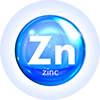
In the human body, this trace and essential element plays a vital role. It is involved in vital biochemical and physiological functions in the body.
Zinc is important for:
• normal function of the immune system,
• synthesis of proteins and nucleic acids,
• physical growth and development,
• fertility and reproduction,
• the production of insulin (it affects the metabolism of sugars, fats and proteins),
• protection of cells from oxidative stress and free radicals,
• wound healing and has a beneficial effect on the skin, hair and nails,
• appetite support,
• prevention of chronic and degenerative diseases,
• the correct process of cell division, etc.
The body cannot synthesize zinc, so its intake through food is necessary.
Main sources: meat, milk, eggs, whole grains, legumes, seafood, nuts, etc.
Zinc deficiency can be manifested by:
• fatigue,
• frequent mood swings and other psychological manifestations,
• immune disorder,
• slow wound healing, skin changes (dermatitis),
• loss of appetite,
• hair loss, brittle nails,
• infertility,
• growth disorders etc.
Zinc can also be used during the flu and cold season, when it is possible to use its immunostimulating ability. It shows a better effect in combination with vitamin C.
We have various options for supplementing zinc - with a varied diet or nutritional supplements.
Do not hesitate to contact your pharmacist when choosing a specific product.
Free according to the web portal of the Czech Chamber of Pharmacy for the public Lékárnické kapky, 28/12/2023

28. 2. 2026
Annual protective limit for deductible co-paymentsA new system of reimbursement of deductible co-payments for medicines has been in effect for more than a year. Thanks to this ...

31. 1. 2026
eVouchers in practice eVouchers are electronic vouchers for medical devices and, with their functionality, they will mandatorily replace paper vouchers from January 1, 2026.